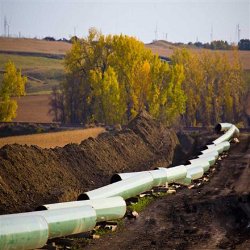That’s right, a cross-border pipeline has been approved!
It’s probably not what you’re thinking. The Keystone XL pipeline is still sitting on the sidelines. But while everyone is in a fuss over TransCanada’s (NYSE: TRP) project, the Obama administration quietly approved a different U.S.-Canadian pipeline right before the Thanksgiving holiday.
 This time it’s Kinder Morgan’s (NYSE: KMI) and its Cochin Reversal Project – a pipeline that will cross the U.S.-Canada border and benefit the tar-sands oil industry.
This time it’s Kinder Morgan’s (NYSE: KMI) and its Cochin Reversal Project – a pipeline that will cross the U.S.-Canada border and benefit the tar-sands oil industry.
The tar-sands are in desperate need of a new pipeline. Until now, this has been met by countless delays, adding to the tar-sands’ already high costs and rivaled production. Canada, the world’s sixth largest crude producer set to become a superpower in the oil and gas industry, desperately needs the infrastructure to see its hopes come to fruition.
Canada sits on the world’s third-largest oil reserves, and production from its tar-sands is projected to double over the next decade.
Kinder Morgan Cochin LLC, the existing pipeline, will now be allowed to reverse, and it will be expanded to transport gas condensate or ultra-light oil to an Illinois terminal from the Eagle Ford shale basin in Texas. From the terminal, the pipeline will carry those supplies along the improved route that runs northwest into Alberta, Canada.
Once it reaches Alberta, the supplies will be used to thin tar-sands oil, or bitumen, so it can travel through pipelines. Without this, tar-sands oil is too thick for transport.
And this is where Canada can start to focus on getting its production to a demanding Asian market, where prices are far higher than in North America, which sees a $30 discount per barrel.
The Cochin Reversal Project will cost the Houston-based Kinder Morgan roughly $260 million.
The Pipeline
We know that this project will focus exclusively on carrying gas condensate used to dilute the bitumen found in Canada’s British Columbia, which requires a cut of about 30 percent so it can be shipped out.
But the pre-existing Cochin pipeline has had some safety issues in the past. Just last year, Canada’s National Energy Board sent Kinder Morgan a letter identifying significant problems along its pipeline, including corrosion, cracking, and an insufficient methodology by the company to detect those problems.
According to the Vancouver Observer, the U.S. Pipeline and Hazardous Materials Safety Administration (PHMSA) issued an order for a 20 percent pressure restriction on the pipeline. Kinder Morgan would later add further restrictions on its own accord before receiving approval to increase the operating pressure in the U.S. to 6,895 (1,000 psi) in March 2012.
Environmentalists also worry that the boost in bitumen production will increase greenhouse gas emissions. We expect this, but what is worth noting is that just one day before the Cochin project was approved, the U.S. House of Representatives approved a bill that, if made into law, would charge $5,000 to individuals or groups to file an official protest.
Our analysts have traveled the world over, dedicated to finding the best and most profitable investments in the global energy markets. All you have to do to join our Energy and Capital investment community is sign up for the daily newsletter below.
Keystone
As for what this might mean for the Keystone pipeline and others awaiting approval, it’s hard to tell just what this administration is thinking. But it’s interesting that they would approve a project that promotes the tar-sands.
TransCanada originally planned to have its Keystone XL online in 2012, and here we are eyeing 2014.
We do think this pipeline proposal will likely either get approved or rejected in 2014 or 2015, but who really knows? This administration has only taught us one thing when it comes to energy: it’s inconsistent.
The Investor
Here we are, finally with a link to the tar-sands and the shale revolution that is about to see it explode.
The driving demand for diluent by producers in Alberta has created a growing market for U.S. producers of natural gas liquids, especially for those who are fracking.
Pipelines in Canada already carry 15 percent of the nation’s exports in the form of crude, mostly to U.S. markets, according to Bloomberg. Canada’s oil trade rose 7 percent last year, and it is set to grow faster than its economy can keep up with, especially as Canada partners up with China and other Asian markets.
Alberta sits in a remote region of Canada, putting it at a cost disadvantage to competitors. It’s going to need infrastructure like that of the Cochin pipeline to support its production. In the meantime, Iran is making its move and interest rates are rising, putting greater pressure on Alberta to create infrastructure.
2014 should be a year to watch for pipelines. We know we need a connection between the Pacific and Atlantic coasts, and the north and south, but what are we going to do about it?
This New Year will give us those answers.
If you liked this article, you may also enjoy:




